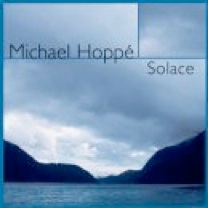
Solace
Michael Hoppé
2003 / Spring Hill Music
51 minutes
Review by Kathy Parsons
Michael Hoppé’s Solace is a marvel of artistry and technology. His thirteenth album, Hoppé says that this recording came to life through a series of miracles that allowed him to create a much more complex rendition of his work. Last year, a fan that he had never met contacted Hoppé, offering to help him further his vision in some way out of gratitude for the “solace” Hoppé’s music had brought to his own life. Hoppé told him that he’d love to work with a full symphony but that the cost was prohibitive. The benefactor said he would take care of it. Shortly after that, Hoppé received a card in the mail announcing the possibility of recording with the Prague Symphony without having to travel to Czechoslovakia - the recording sessions would take place over the Internet from his hometown of Los Angeles. The orchestral parts were sent to Prague via the Internet and copied there. For the actual recording, engineers created at live Internet link from a large studio in Prague to another studio in Los Angeles, enabling the people in both studios to see and interact with each other. From LA, Hoppé was able to conduct the orchestra, and it was even possible to remotely activate a small video camera for close-ups of the soloists! Four of the album’s twelve tracks were recorded with the symphony: “This Majestic Land,” “Romance for Violin and Orchestra,” “Renouncement,” and “Nimbus.” All four are gorgeous, and revel in Hoppé’s classical roots. The piece that has been creating a lot of “buzz” in relation to this album is Vangelis’ appearance playing Hoppé’s own “The Parting.” This is not a new recording, but a tweaked version of a cassette recording Hoppé made in 1986 while visiting his hero at his home (then in New York). The two composers were talking about their recent work, and Hoppé played a 3-minute version of “The Parting.” Vangelis then did an 8-minute take while Hoppé recorded the impromptu performance. Many years later, Hoppé had a friend who owns a mastering facility transfer the recording, removing unwanted background noise and expanding the dynamic range. Hoppé then sent the new recording to Vangelis who gave him permission to use it on Solace. Michael Hoppé hopes that this music will give “a sense of much needed peace in an increasingly troubled world... and a continued belief in small miracles.” As on previous albums, Hoppé’s music tends to be melancholy, but is so shimmeringly beautiful and elegant that it soothes and lifts the spirit. Hoppé has been one of my favorite artists for many years, and this is definitely one of his very best albums to date. Miracles set to music!
April 4, 2003

